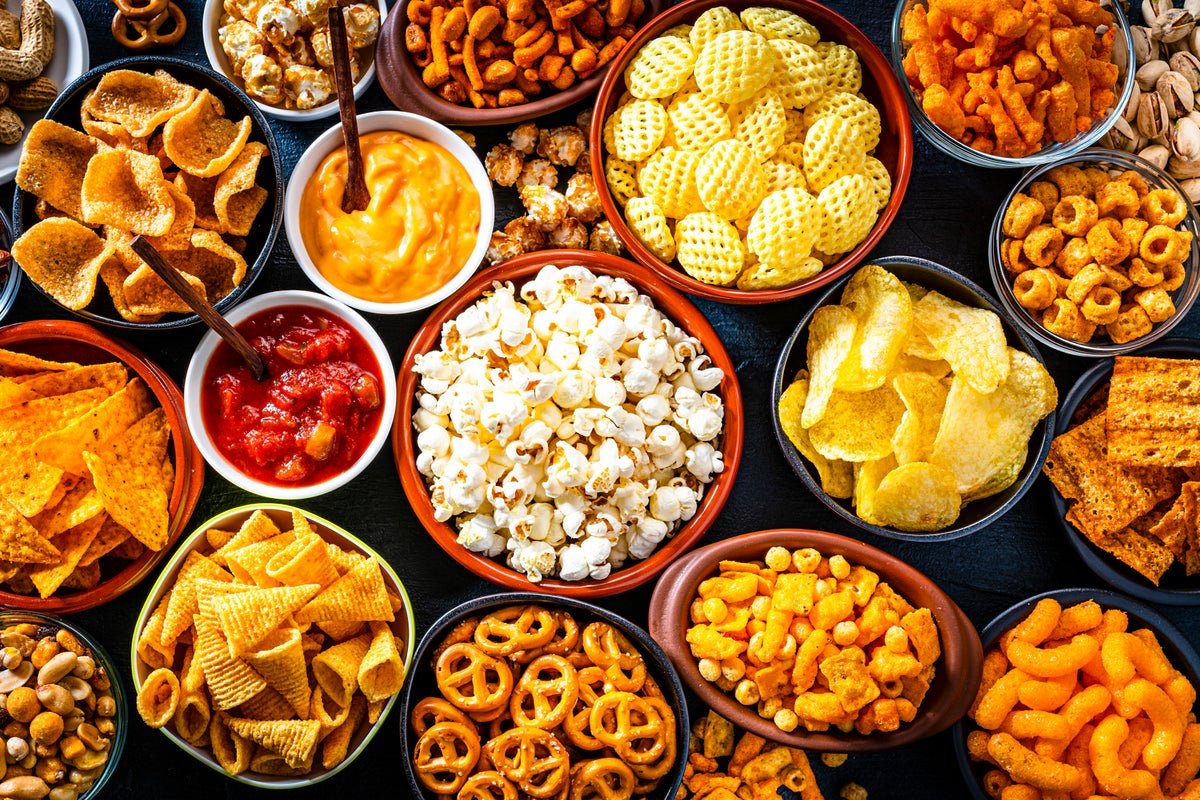Climbing charges of colon and rectal most cancers amongst individuals below 50 years previous is a striking recent trend that has alarmed and puzzled clinicians racing to determine why. Now a brand new examine printed in Intestine presents what is likely to be an important perception: particular lipids, or fatty acids, which can be abundantly present in ultra-processed foods may be promoting inflammation that causes cancerous colon cells to run amok.
Colorectal most cancers tumor samples from 81 individuals within the U.S. had extreme quantities of inflammation-boosting lipids, referred to as omega-6 fatty acids—and lacked useful lipids referred to as omega-3 fatty acids, which assist cease irritation.
Irritation is a standard defensive response that the immune system switches on to heal wounds or combat off an infection. However researchers within the 1800s discovered that colon tumors below a microscope seemed like “poorly healed wounds,” says Timothy Yeatman, a co-author of the examine and a professor of surgical procedure on the College of South Florida. Rampant irritation over lengthy durations of time damages cells and hampers their skill to combat probably cancerous cell development. Omega-6 fatty acids usually come from our weight loss program, and Yeatman suspects ultraprocessed food is probably going a significant supply of them.
On supporting science journalism
If you happen to’re having fun with this text, think about supporting our award-winning journalism by subscribing. By buying a subscription you might be serving to to make sure the way forward for impactful tales concerning the discoveries and concepts shaping our world right this moment.
“We do not know the total results of those ultraprocessed meals on our physique, however we do know that that’s a significant factor that’s modified from 1950 onward,” Yeatman says. “Younger individuals right this moment, notably rural and impoverished individuals, are being uncovered to extra of those processed meals than anyone else as a result of they’re low cost and so they’re in all of the fast-food eating places.”
Many ultraprocessed meals and quick meals are ready with seed oil—an affordable, widespread sort of vegetable-based cooking oil that’s chemically processed from seeds corresponding to canola (rapeseed), corn, grapeseed and sunflower. These oils comprise excessive quantities of omega-6 fatty acids. The examine was not in a position to definitively join the lipids detected within the colon most cancers tumors to any particular meals or oil, nevertheless.
“I believe the examine confirms that weight loss program is necessary however in all probability certainly one of many elements,” says Andrew Chan, a gastroenterologist at Massachusetts Common Hospital and a professor of drugs at Harvard Medical College, who was not concerned within the new analysis. Chan and different researchers word that genetics, train, life-style and chemical or environmental exposures may influence colon cancer risk, too. Moreover, “there’s a number of complexity to the meals we eat, the way it’s transformed, the way it’s metabolized and the way it may ultimately result in tissue modifications round issues like lipids,” Chan says. “So there are nonetheless some items that must be stuffed in earlier than we will actually inform a cohesive story about it.”
Scientific American spoke additional with Yeatman and Chan concerning the findings and the potential function of ultraprocessed meals in irritation and colon most cancers.
[An edited transcript of the interviews follows.]
What has previous analysis proven us concerning the relationship between weight loss program and colon most cancers?
CHAN: There was analysis up to now wanting on the affiliation of colorectal most cancers threat and particular dietary patterns that we all know are related to irritation. A few of these dietary patterns are enriched with particular forms of oils, corresponding to people who embrace omega-6 fatty acids, which can be recognized to be proinflammatory. In distinction, there have been knowledge to point out that dietary patterns which can be enriched with more healthy oils, for instance, Mediterranean dietary patterns, or so-called prudent dietary patterns, appear to be linked with decrease threat. And as well as, there have been some specificstudies which have seemed on the impact of forms of omega-3 fatty acids, corresponding to fish oils, and their skill to probably have a preventive impact on colorectal most cancers threat. That’s been mostly shown in animal models, however there have been some medical trials that recommend there’s probably a profit to supplementing one’s weight loss program with fish oil, for instance. These types of research are still inconsistent, so I believe there must be extra work achieved on this space.
Our group and others have additionally been inquisitive about the concept that a few of these lipids which can be answerable for irritation that may result in most cancers may be inhibited by medicine like aspirin. Aspirin is a drug that’s an anti-inflammatory and likewise particularly has results on lipids corresponding to prostaglandins, which can promote most cancers. These are useful steps to creating novel most cancers prevention methods which can be targeted on altering the steadiness of those lipids and the steadiness of inflammatory mediators that might be associated to a few of these lipid pathways.
How do the lipids have an effect on irritation?
YEATMAN: Whenever you get a wound in your hand or your pores and skin, it swells and turns pink initially due to irritation, after which it will get higher, and that’s due to the decision irritation. Resolving lipids, or proresolving lipids, had been solely just lately found by Charles Serhan of Harvard College. And he described one thing referred to as “lipid class switching,” which implies that the physique, when it undergoes regular therapeutic, will swap from the inflammatory section to the resolving section. He principally discovered that there are a selection of those lipids—primarily omega-3 by-product lipids—that result in decision of irritation. However irritation, unchecked, can result in most cancers.
How does this irritation affect most cancers growth?
CHAN: Irritation results in alterations within the tissue, which can result in the event of most cancers. The tissue could also be extra prone to develop in an uncontrolled approach the place it’s tough to have cells flip over usually, and in order that irregular cell turnover and that overexuberant dividing of cells can in the end result in the formation of tumors. We all know irritation can also create an surroundings that makes tissue extra vulnerable to develop modifications within the DNA, corresponding to mutations that might result in most cancers. There additionally could also be some results of irritation that impair the way in which the physique’s in a position to naturally combat off the event of cancers.
I believe that these totally different lipids and oils might have particular results and pathways associated to irritation and the flexibility of tissues to restore in a standard approach. Which will lend itself to an surroundings by which a few of these tissues might grow to be cancers due to uncontrolled cell development.
Why may this imbalance in proinflammatory and proresolving lipids occur?
YEATMAN: The supply of those lipids is in the end dietary. So proinflammatory lipid excesses within the tumor microenvironment is the smoking gun that this probably pertains to lipids we’re consuming. The degrees of omega-6 lipid, which is the inflammatory facet, in human physique fats has elevated dramatically from the Nineteen Fifties to right this moment. And doubtless that’s due to the Western weight loss program modifications. And also you return to what these modifications are, effectively, they’re ultraprocessed meals. Now, ultraprocessing entails extra than simply lipids, however lipids are in lots of seed oils, corresponding to soybean oil, canola oil, cotton seed oil, sunflower oil, safflower oil, which were processed and are utilized in meals. Seed oils are cheap, however the consequence of that’s: they’re in virtually all the things we eat that comes packaged. For instance, in the event you go to the shop and get bread off the shelf that hasn’t been baked by an area bakery, you’ll discover there’s a complete listing of components in that bread which can be laborious to even acknowledge…, and certainly one of them is mostly soybean oil. It’s in all the things: bread, chips, hummus, salad dressing, cookies, muffins, pies.
It’s not simply seed oil. When you’ve got corn-fed beef, the omega-6-to-omega-3 ratio [can be much higher than that of grass-fed beef]…, so that easy change from corn-fed to grass-fed makes an enormous distinction within the ratio. However it may be very laborious to seek out grass-fed beef on the grocery story. And the reason being that it prices cash; I believe it takes three years to convey a steer to market that’s grass-fed and perhaps one 12 months for corn-fed. So it’s lots much less time for the cheaper method.
Are omega-6 fatty lipids dangerous for well being?
YEATMAN: Omega-6 is a vital fatty acid. You’ve bought to have it—however you don’t want it at [a ratio of] 30 occasions to 1, [compared with omega-3]. So it’s like all the things else: it ought to be sparsely. However the issue is we’ve massively overdone the quantity of seed oil in meals. And I don’t suppose seed oils are essentially good for you as a result of we get omega-6s from all types of different sources.
Not everyone with seed oil publicity will in all probability endure an issue from it. However I believe there’s some hyperlink there. These hyperlinks are laborious to show as a result of we’d must have a dietary historical past on individuals for years. Extra investigations are wanted, and somebody must show that seed oils, taken within the extra quantities they’re given to us, are really secure. And that hasn’t been confirmed but to me, so I believe the default ought to be scale back them till .























































